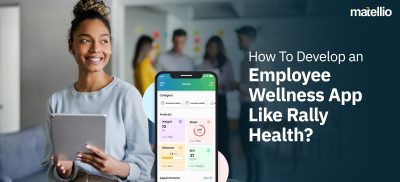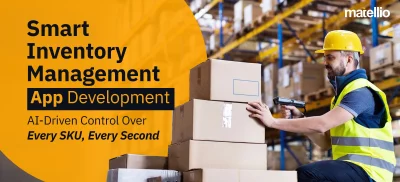
The event management industry is undergoing a rapid transformation with the integration of digital tools. Event apps have emerged as a fundamental solution for streamlining operations, enhancing attendee experiences, and improving overall communication. With businesses increasingly hosting events to connect with audiences and build brand value, the demand to develop an event app has surged. These apps not only simplify event planning but also provide real-time updates, foster attendee engagement, and ensure seamless management. Furthermore, custom event apps enable businesses to gather valuable insights through advanced analytics, paving the way for more successful and impactful events.
What Is an Event App?
An event app is a digital solution designed to facilitate event planning, execution, and attendee engagement. These apps streamline operations by offering features like ticketing, scheduling, notifications, and attendee networking. They cater to various types of events, from corporate conferences to festivals, ensuring seamless experiences for both organizers and participants.
Source – Market Research Future
How Does an Event App Work?
An event app acts as a bridge between event organizers and attendees, providing a centralized platform that simplifies the management of event-related tasks. It streamlines processes such as ticketing, scheduling, attendee communication, and data tracking, ensuring smooth execution and enhanced user experiences. Let’s break down the key components of how an event app works:
 Backend Systems
Backend Systems
The backend is the backbone of an event app, responsible for managing data, performing complex operations, and ensuring the app runs smoothly. It includes:
- Data Management: Securely stores user data, attendee details, event schedules, and ticketing information in a scalable and structured format, enabling quick data retrieval during high traffic. This foundational step is crucial for businesses planning to develop an event app with robust and reliable systems.
- Payment Processing: Integrates with secure payment gateways to handle transactions, refunds, and financial records while maintaining PCI-DSS compliance for user safety.
- Realtime Updates: Utilizes frameworks like Node.js or Django to establish seamless communication between the server and app, ensuring instant responses to user actions.
- Scalability: Incorporates cloud platforms like AWS or Google Cloud to dynamically adjust resources during peak event times, preventing crashes or slowdowns.
 Frontend Interface
Frontend Interface
The front end is what users interact with and is designed to deliver a seamless experience. Key aspects include:
- Responsive Design: Built using tools like Flutter or React Native, the app is optimized to function smoothly across a variety of screen sizes and resolutions, offering consistent user experiences. For successful event app development, a responsive design ensures broad accessibility and user satisfaction.
- User-Friendly Navigation: Features an intuitive layout with clearly labeled menus, allowing users to access event details, register, or purchase tickets without confusion.
- Customization: Enables organizers to incorporate branding elements such as logos, color schemes, and themes, providing a personalized look and feel that aligns with the event’s identity.
 Data Integration
Data Integration
Event apps rely heavily on integrating various third-party services to expand functionality. This includes:
- APIs for Payment Gateways: Securely connect with services like PayPal, Stripe, or Razor pay to process payments in multiple currencies while ensuring transaction speed and reliability. A trusted event management app development process ensures smooth API integration for seamless user experiences.
- Attendee Management Tools: Enables real-time attendee tracking, profile creation, and registration updates, providing organizers with an organized database of participants.
- Analytics Integration: Collects detailed data on user behavior, session attendance, and engagement levels, enabling organizers to measure event success and optimize future strategies.
 Realtime Updates
Realtime Updates
Realtime capabilities are critical for keeping attendees informed and engaged throughout the event. This is achieved through:
- Instant Notifications: Sends alerts about schedule changes, session reminders, or special announcements, ensuring attendees never miss important updates. A reliable mobile app development process ensures these notifications are delivered accurately and promptly.
- Agenda Updates: Provides users with instant access to the most up-to-date event schedules, including last-minute changes or new speaker additions.
- Live Polls and Q&A: Facilitates audience participation during sessions, making events more interactive while collecting valuable attendee feedback.
- Firebase Technology: Realtime database systems like Firebase enable instant data synchronization, ensuring both organizers and attendees access accurate information at all times.
Why Should Businesses Choose to Develop an Event App?
Developing an event app is a transformative decision for businesses aiming to streamline event operations, enhance attendee engagement, and improve overall event efficiency. Whether you are managing small-scale gatherings or large corporate conferences, the advantages of investing in a tailored event app are undeniable. Here’s why businesses should consider this approach:
Streamlined Event Management
An event app simplifies all aspects of event planning by consolidating tasks like attendee registration, ticketing, and event tracking into a single platform. This centralized approach significantly reduces the burden of managing multiple tools or manual processes, saving time and minimizing errors. Businesses leveraging digital transformation services for event management can use event apps to bring unparalleled efficiency to their operations.
Enhanced Attendee Experience
A custom app makes attending events seamless for users by offering features such as personalized schedules, real-time notifications, and intuitive navigation tools. These capabilities allow attendees to focus on the event itself rather than on logistical challenges. Organizations that choose to develop an event app provide their users with a tool that fosters engagement, improves satisfaction, and leaves a lasting impression.
Improved Communication
Effective communication is key to a successful event, and event apps make it easy to share real-time updates, announcements, and schedule changes with attendees. Push notifications to ensure no one misses important updates, while in-app messaging fosters direct interactions between attendees and organizers. This is why event app development is gaining popularity as a reliable solution for clear and consistent event communication.
Data-Driven Insights
Event apps provide real-time analytics that help organizers track attendee behavior, session attendance, and engagement levels. This data is invaluable for evaluating the success of an event and identifying areas for improvement. Businesses opting for event management app development can make data-driven decisions to optimize future events, enhancing ROI and attendee satisfaction.
Cost-Effectiveness
Automating event operations through an app minimizes overhead costs, such as expenses for printed materials or additional staffing for manual registration and ticketing. By digitizing these processes, businesses not only save money but also promote sustainability. Choosing event mobile app development ensures operational efficiency while reducing the overall cost of managing events.
Brand Recognition
A custom event app provides businesses with the opportunity to showcase their brand in a consistent and professional manner. Incorporating logos, themes, and brand-specific elements within the app enhances brand visibility and reinforces a tech-savvy image. Opting for mobile app development events ensures that your app reflects your brand identity while delivering value to attendees.
Sponsorship Opportunities
Event apps open new revenue streams by offering dedicated spaces for sponsors to promote their brands. Whether through banner ads, virtual booths, or interactive content, sponsors can connect directly with attendees in meaningful ways. With mobile event app development, businesses can attract high-value sponsors and strengthen relationships with key stakeholders.
Ready to Build a Secure, Scalable, and Engaging Event App? To stand out, an event app must combine core functionality with next generation features for superior performance. You can upgrade your business by custom-building an event app laced with these advanced features to enhance your event management processes and attendee experiences. For expert guidance and tailored solutions, consider leveraging technology consulting services to ensure your app is designed for maximum efficiency and scalability. Event apps are versatile tools that cater to a variety of industries and purposes, each tailored to meet specific needs. From corporate events to personal gatherings, these apps help streamline operations, enhance attendee engagement, and ensure a seamless experience for both organizers and participants. Below is an elaboration of the different types of event apps and how they cater to unique requirements. Read More: Simplify event planning with a custom venue booking app like Peerspace. Learn how to develop an event venue booking app tailored to your needs. Event apps are powerful tools that cater to a variety of industries and needs, offering unique functionalities that streamline operations, enhance attendee engagement, and ensure a successful event experience. Below is a detailed look at the different use cases of event apps, highlighting how they cater to diverse event types and their specific requirements. Conferences and trade shows require robust tools to manage large-scale logistics and ensure seamless experiences for attendees and organizers. Event apps provide a centralized platform for these professional gatherings. Music festivals are dynamic events with multiple stages, artists, and large crowds. Event apps are essential for managing these complexities while enhancing attendee experiences. Corporate meetings, whether internal or external, benefit greatly from apps that centralize communication and streamline participation. Event apps ensure efficient management and foster collaboration. Charity events like fundraisers, volunteer programs, or awareness campaigns need apps that encourage active participation and simplify donation tracking. Sports tournaments, whether professional leagues or local matches rely on apps to manage event logistics, engage audiences, and track results. Educational events, including training sessions, academic conferences, and workshops, require apps to facilitate learning and interaction. Product launches are critical marketing events designed to create excitement and buzz around new offerings. Event apps play a pivotal role in ensuring their success. Elevate Your Event Experience with a Next-Generation Event App! Creating an event app requires a detailed and well-structured approach to deliver a product that meets user expectations and enhances event management processes. Below is an in-depth overview of the development process, ensuring each step incorporates the best practices for success. The initial step in developing an event app involves understanding the target audience, market trends, and competitor offerings. This stage is crucial for identifying gaps and crafting a strategy that aligns with market demands. As a Top Event Mobile App Development Company, we help businesses conduct thorough research, ensuring their app is designed to stand out with features that resonate with their audience. The features and technology stack chosen to play a significant role in determining the app’s performance, scalability, and security. Features like ticketing, notifications, and attendee engagement should be seamlessly integrated with advanced backend technologies. Tech Stack for Developing an Event App The tech stack mentioned above is a general recommendation for developing an event app. By leveraging cloud integration services, we ensure that your app remains scalable and performs reliably during high traffic, with secure data storage and real-time access. However, it can be customized based on the specific requirements, features, and scope of your project. Partnering with an experienced development team like us ensures the tech stack is tailored to align with your unique goals. A visually engaging and user-friendly design is critical to ensuring user retention and satisfaction. The design process focuses on intuitive navigation and aesthetically pleasing layouts. Our design team specializes in creating interfaces that help businesses effectively develop an event app with stunning designs and smooth user experiences tailored to the event’s theme and purpose. This phase involves building the app’s frontend and backend functionalities, ensuring seamless integration of all features. The front end caters to the user interface, while the backend handles database management, security, and real-time updates. With expertise in event app development, we develop high-performing apps using cutting-edge tools, balancing user-friendly interfaces with robust backend solutions for optimal functionality. Security is a top priority for event apps, particularly those handling ticketing, payments, or attendee data. Ensuring compliance with data privacy standards and implementing advanced encryption protocols is essential. Through our event management app development process, we integrate two-factor authentication, secure payment gateways, and compliance measures to safeguard sensitive user information. Thorough testing ensures that the app functions seamlessly across devices, platforms, and scenarios. This includes functional, performance, and security testing to eliminate bugs and errors. As part of our event mobile app development services, we conduct end-to-end testing to ensure a flawless app experience, identifying and resolving potential issues before deployment. Once the app passes rigorous testing, it’s deployed on platforms like the Apple App Store and Google Play Store. Post-launch monitoring and maintenance are crucial for ensuring the app remains functional and up to date. As a leading mobile app development events partner, we handle the deployment process and offer ongoing support to update features, enhance performance, and adapt to user feedback. The field of event app development is constantly evolving, introducing innovative trends that redefine user experiences and optimize performance for organizers. Below is an in-depth look at the future trends in event app development, showcasing how they are shaping the industry. Keep Your Events Future-Ready with Insights into Event App Development Trends! In today’s fast-evolving event management landscape, creating exceptional experiences through efficient organization and enhanced engagement is paramount. A custom-built event app can revolutionize how you plan, manage, and execute events by offering real-time updates, seamless coordination, and improved attendee interaction. If you’re looking to develop an event app, Matellio offers tailored solutions designed to meet your specific needs. Whether it’s for conferences, corporate events, festivals, or personal gatherings, our team of experts delivers secure, scalable, and intuitive event apps that ensure a user-friendly experience for all stakeholders. If you’re ready to transform your event management process, Matellio’s expert team is here to assist. Fill out the form today to schedule a consultation and take the first step toward creating your custom event app! Building an event app involves understanding user needs, designing a user-friendly interface, developing backend and frontend systems, integrating advanced features like realtime updates and ticketing, and thorough testing. Matellio can guide you through each step to successfully launch the app. Yes, we ensure smooth integration with popular platforms like CRM tools, social media, and email marketing systems, allowing seamless communication and attendee management Essential features include event schedules, push notifications, ticketing, attendee networking, interactive maps, and analytics. We customize these features to meet your specific needs. The timeline depends on the complexity of the app and your requirements. After evaluating your needs, we provide a detailed project roadmap to ensure timely delivery. The cost varies based on the app's features, design, and platform compatibility. Matellio offers flexible pricing models to deliver a high-quality app within your budget. Essential Features of an Event App
Core Features
Next-Generation Features
User Registration and Login
AI-Powered Recommendations
Event Schedule and Agenda
Personalized Notifications
Push Notifications
Smart Analytics Dashboards
Ticketing and Payment Systems
Networking Matchmaking Tools
Interactive Maps
Voice-Assisted Search
Feedback Forms
Multi-Language Support for Global Events
Attendee Networking
Offline Access for Event Details
Types of Event Apps
Corporate Event Apps
Social Event Apps
Festival Apps
Community Event Apps
Educational Event Apps
Use Cases of Event Apps
 Conference and Trade Shows
Conference and Trade Shows
 Music Festivals
Music Festivals
 Corporate Meetings
Corporate Meetings
 Charity Events
Charity Events
 Sports Tournaments
Sports Tournaments
 Educational Workshops
Educational Workshops
 Product Launches
Product Launches
Steps to Develop an Event App
 Market Research and Planning
Market Research and Planning  Defining Features and Tech Stack
Defining Features and Tech Stack
Category
Technology/Tool
Frontend Development
React Native, Flutter, Angular, Swift (for iOS), Kotlin (for Android)
Backend Development
Node.js, Django, Ruby on Rails, Spring Boot
Database
MongoDB, PostgreSQL, Firebase Realtime Database
Payment Gateways
Stripe, PayPal, Razorpay, Square
Cloud Hosting
AWS (Amazon Web Services), Google Cloud, Microsoft Azure
Push Notifications
Firebase Cloud Messaging, OneSignal, Amazon SNS
Analytics
Google Analytics, Mixpanel, Amplitude
Real-Time Updates
Firebase, WebSockets, SignalR
Authentication
OAuth, Firebase Authentication, Auth0
APIs for Integration
Google Maps API (location services), Twilio (communication), Zoom API (webinars)
 UI/UX Design
UI/UX Design  App Development
App Development  Security Implementation
Security Implementation  Testing
Testing  Deployment and Maintenance
Deployment and Maintenance 
Future Trends in Event App Development
AI-Driven Personalization
Smart Analytics
Voice Search Integration
5G-Enhanced Features
Sustainability Features
Gamification
Multi-Language Support
How Can Matellio Help You to Develop an Event App?
Here’s How Matellio Can Help Your Business:
Event App Development – FAQ’s
Q1. How to build an event app?
Q2. Can an event app integrate with other platforms?
Q3. What features are essential in an event app?
Q4. What is the timeline for developing an event app?
Q5. How much does event app development cost?

 Backend Systems
Backend Systems Frontend Interface
Frontend Interface Data Integration
Data Integration Realtime Updates
Realtime Updates

